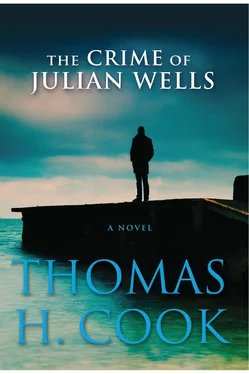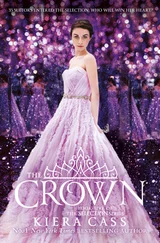Thomas Cook - The Crime of Julian Wells
Здесь есть возможность читать онлайн «Thomas Cook - The Crime of Julian Wells» весь текст электронной книги совершенно бесплатно (целиком полную версию без сокращений). В некоторых случаях можно слушать аудио, скачать через торрент в формате fb2 и присутствует краткое содержание. Год выпуска: 2012, ISBN: 2012, Издательство: Grove Press, Жанр: Криминальный детектив, на английском языке. Описание произведения, (предисловие) а так же отзывы посетителей доступны на портале библиотеки ЛибКат.
- Название:The Crime of Julian Wells
- Автор:
- Издательство:Grove Press
- Жанр:
- Год:2012
- ISBN:9780802194589
- Рейтинг книги:5 / 5. Голосов: 1
-
Избранное:Добавить в избранное
- Отзывы:
-
Ваша оценка:
- 100
- 1
- 2
- 3
- 4
- 5
The Crime of Julian Wells: краткое содержание, описание и аннотация
Предлагаем к чтению аннотацию, описание, краткое содержание или предисловие (зависит от того, что написал сам автор книги «The Crime of Julian Wells»). Если вы не нашли необходимую информацию о книге — напишите в комментариях, мы постараемся отыскать её.
The Crime of Julian Wells — читать онлайн бесплатно полную книгу (весь текст) целиком
Ниже представлен текст книги, разбитый по страницам. Система сохранения места последней прочитанной страницы, позволяет с удобством читать онлайн бесплатно книгу «The Crime of Julian Wells», без необходимости каждый раз заново искать на чём Вы остановились. Поставьте закладку, и сможете в любой момент перейти на страницу, на которой закончили чтение.
Интервал:
Закладка:
According to Julian, those emotions had been unearthed not only by the haunting nature of an unsolved crime, but because, for the people of Cuenca, all mysteries had to be solved, else demons would rule the world.
Armed by their unwavering faith, the Grimaldos family had refused to forget poor, lowly El Cepa. Holding him in their memory and seeking justice for his murder became their sole obsession, a work of the soul carried out in countless acts of remembrance, El Cepa the persistent subject of their daily conversation. But Julian had also recorded the family’s endless chores-planting and harvesting, sweeping, washing, trudging to the well and back again, the backbreaking work their bodies had endured even as their minds continued to be ceaselessly tormented by their brother’s vanishing-and with each day they grew more convinced that Valero and Sanchez, still their neighbors and men they saw each day, had murdered him.
They watched and waited, and in 1913, when a new judge was appointed over Cuenca, they seized the moment and drew their swords again, now hopeful that the earlier judge’s dismissal of the case against Valero and Sanchez for lack of evidence might be overturned.
The new judge was young and zealous, and the specter of an unsolved crime, as Julian wrote, worked like a rattle in his brain.
Valero and Sanchez were rearrested, and this time the Guardia Civil was determined that the killing of Jose Maria Lopez Grimaldos, as well as the obvious torment it had caused his family, would not go unavenged.
The torture inflicted upon Valero and Sanchez was hideous, and Julian’s account of it was highly detailed. Initial reviews of the book had noted, not always approvingly, the graphic nature of his description, but reading it now, I was struck by the fact that Julian had written of those torments through the eyes of the men who’d suffered them. In Cuenca, I had told him about a painting of men scourging Christ, the expressions on their faces as they’d tormented him. Julian had placed his emphasis on the suffering of the victims, and in reading it again, I found myself admiring how he made the lashes fly so that I heard their crack and felt their terrible bite as if entirely encased within the very flesh they tore.
Had this been Julian’s greatest gift, I wondered, that he had been able to describe with such terrible depth, wounds he had neither felt himself nor inflicted upon another?
I wasn’t sure, but for my little talk at Julian’s memorial ceremony, it would have to do.
5
“It wasn’t Julian’s hard work that made him singular,” I said. “Nor was it even the depth of his research. It was the way he made the reader feel the sting of the lash, the blunt force of the truncheon, the point of the knife. His books are the echoing cries of those whom time has silenced. He never turned away from pain, or cheapened it, or added to it the slightest degree of false amelioration. The purpose of an artist is to convey the harder truths so that we may understand them and learn from them and be less baffled by life. This is what Julian did because he was an artist.”
Thus, with a thud, my little talk ended.
The people assembled beneath the white tent Loretta had had erected on the lawn of the Montauk house had listened respectfully, but they were clearly happy I was done. They’d thought me a windbag, I knew, and a boring one at that.
I glanced to the left, where the pond winked in the light, the yellow boat beside it.
I had failed Julian once again.
I recalled Harry’s request for a plug.
“ The Commissar , Julian’s study of Andrei Chikatilo, will be published next fall,” I added. “I hope you all will read it.”
I waited a beat, added the required “Thank you,” then stepped away from the lectern.
I was the last to speak, so the people now rose and made their way out of the tent and into the house, where Loretta had food and wine waiting for them. I trailed after the group, but stopped at the entrance of the tent and glanced back toward the lectern. Loretta had placed large photographs of Julian to the right and left of where I’d just spoken. The one to the right was of Julian standing in the snow, the great wall of the Kremlin rising behind him. In the photograph he wore a huge overcoat and an ushanka, a Russian fur cap with large flaps to cover the ears. In one of his letters, Julian had informed me that ushanka meant literally “ear cap.” This had been typical of Julian. He’d known the word for the hippopotamus skin whip with which the Belgians had flayed open the backs of the Congolese, chicotte, and the word for the labyrinthine mines dug in search of water in the Sahara, foggara- words that had given his books a rare authenticity.
“Good job, Philip.”
I turned to find Harry standing next to me, grinning cheerfully, clearly long past our difficult last encounter.
“And thanks for plugging the Russian book,” Harry added. “Loretta finally sent it to me. It’s pretty strange.”
“In what way?” I asked.
“In that Julian focused on Chikatilo’s fantasies,” Harry said. “The way he assumes the part of a patriot when he kills these kids. They were spies. They were traitors. They had to be destroyed to protect Mother Russia.” He glanced toward the house and now clearly wanted to push this unpleasantness aside. “So, you coming?” he asked.
“In a minute,” I said, then turned back toward the front of the tent, my gaze now focused on the photograph to the left of the lectern.
I had no trouble placing the photo, of course. I’d taken it when we were in Buenos Aires, the Rio de la Plata behind him, the two of us about to take a boat to Montevideo with our guide. I’d left Argentina a week later, but Julian had stayed on.
For the first time in a long time, I thought of the grave purpose that had kept Julian in Argentina, the many leads he’d followed, the growing sense of futility as each led nowhere. He had looked everywhere, but had failed to find her. Had he been thinking of that failure while he studied the map of Argentina on that last day? Had he still been thinking of it as he later walked to that little yellow boat?
Loretta had thrown open the windows of the sunroom, and I could hear the white noise of muffled voices, along with the strains of Mahler’s Kindertotenlieder, which Julian had first heard at Two Groves and he later called the saddest music in the world.
For the next hour or so I mingled with the guests, most of whom were friends of Loretta’s who’d come to pay their respects to her departed brother but hadn’t actually known Julian.
By evening everyone had left, so Loretta and I sat alone, still in the sunroom but no longer in the sun. Loretta lit a few candles. They aged the air to a pale yellow, rather than turning the atmosphere romantic. But this perception, I thought, was actually a misperception, a little elegiac twist of mind.
“Julian liked candles,” she said as she poured herself a scotch. “Scotch for you, too, Philip?”
“No, I still have a little wine,” I said.
While Loretta poured herself a drink, I let my eyes roam the bookshelves that lined the adjoining room, the library she’d built some years before. They were filled with books on every imaginable subject, and in that way they suggested the range of Loretta’s mind. For most of her life she’d worked as a freelance copy editor while taking care of her son, Colin, who had died at sixteen from the degenerative disease he’d been born with and which had slowly removed first his ability to stand, then to walk, then to speak, and at last, to breathe. Her husband had left her not long after Colin’s birth, and after that, she’d moved into the Montauk house.
Читать дальшеИнтервал:
Закладка:
Похожие книги на «The Crime of Julian Wells»
Представляем Вашему вниманию похожие книги на «The Crime of Julian Wells» списком для выбора. Мы отобрали схожую по названию и смыслу литературу в надежде предоставить читателям больше вариантов отыскать новые, интересные, ещё непрочитанные произведения.
Обсуждение, отзывы о книге «The Crime of Julian Wells» и просто собственные мнения читателей. Оставьте ваши комментарии, напишите, что Вы думаете о произведении, его смысле или главных героях. Укажите что конкретно понравилось, а что нет, и почему Вы так считаете.












